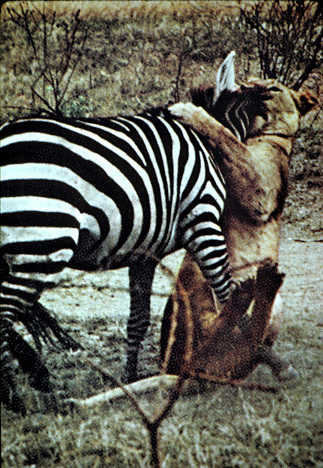Equus burchelli (Plains Zebra) -BIO203
Habitat/Nutrition
The plains zebra can be found in the open grasslands and open woodlands of southeastern Africa(Kamath &Getz, 2012). Zebras prefer to reside in open areas to best flee from predators, if there is an immediate threat a zebra’s best defense is to flee making sharp sporadic movements. This defense makes the open savanna an ideal habitat for zebras. The plains zebra has modified their habitat preferences and movement patterns to avoid encounters and capture by predators such as lions(Fischhoff et al. 2007). After zebras detect the presence of a predator they will move to a different area and inversely if a predator detects zebras it will move to that area resulting in a cyclic movement of predator and prey. Zebras have also adapted their movement patterns based on time of day. As long as there is no immediate threat zebras will routinely shift from various patches of grassland during the day to avoid detection by predators (Fischhoff et al. 2007). During the day zebras will spend their time on the open grasslands grazing as they can easily see approaching predators. At night and specifically at times of dusk and dawn zebras tend to reside in the open woodlands for added security as this is prime predation time.

Photo: Zebra attacked by a lion. Photo taken October, 1969 by H.C.
Kyllingstad.
Zebras have a hindgut fermentation digestive system meaning
zebras must spend 20 hours or more a day grazing(Colvin &
Nihranz, 2009). This need
often outweighs a zebra’s instinct to seek woodlands at night.
Ideally zebras prefer short grasses as they are the most
nutrient dense. Often times this is not the case as zebras are
often the first animals to enter a new grass patch eating long
low nutrient grasses and shrubbery. Though zebras are
mainly consuming low nutrient grasses they are consuming them in
bulk and virtually at all hours of the day which allows the
zebras to meet their required nutritional needs. Zebras
also need to stay within close proximity of water as they need
to drink exactly once a day (ADW, 2013). Adult Zebras may go
2-3 days without water but foals and lactating mares must drink
daily.